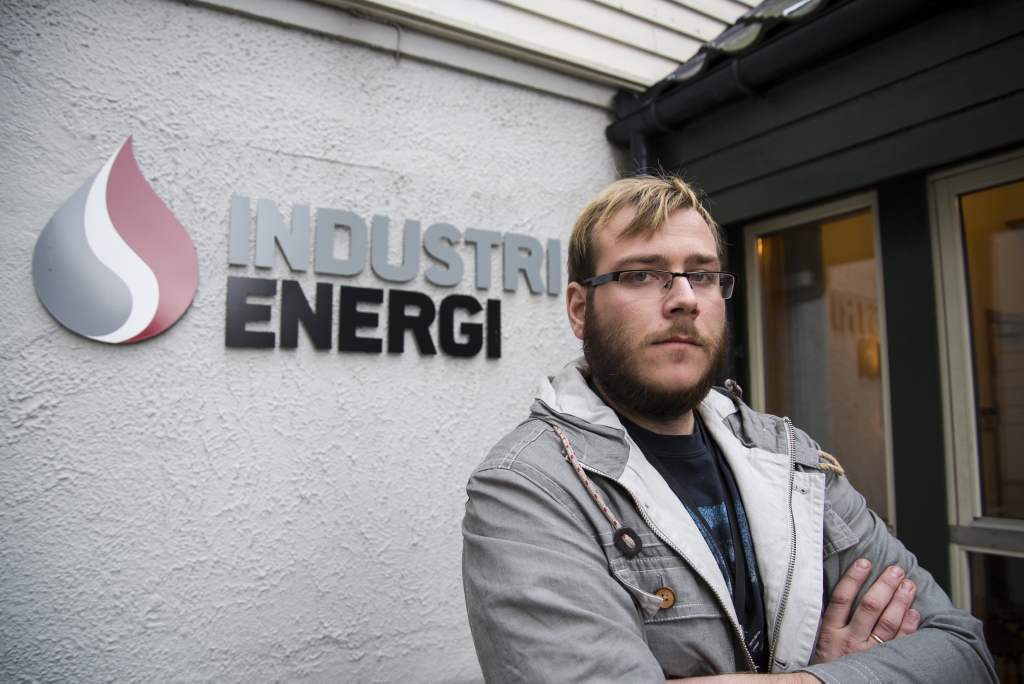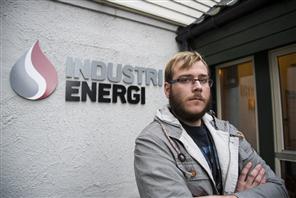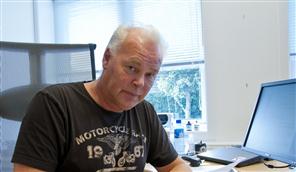Demands an end to drug testing
19.11.2013 15:13:00This autumn one of the Ekofisk committee's members turned in a positive drug test after drinking coffee. "The event strengthens our demand for an immediate stop to the practice of random drug testing," states the head of the Ekofisk Committee, Rolf Bolstad.
For mer informasjon

 Words: Atle Espen Helgesen
Words: Atle Espen Helgesen "They took a saliva test, and I was very surprised when the drug test came back positive. It was an unpleasant experience," Egil Halvorsen tells newspaper Stavanger Aftenblad.
He was taken off the flight, and sent to the Forusakutten medical centre to submit a urine sample. The next day he learned that the procedures for the test had not been followed because he had drunk coffee right before the test. Halvorsen was therefore allowed to travel to the North Sea the same day.
The personnel at the Forusakutten medical centre also tried the drug test themselves after having had coffee. The tests came back positive yet again.
Since then, yet another person has submitted a false positive test – this time even without drinking coffee.
Calling for an end
The Industri Energi-union the Ekofisk Committee has fought against random drug testing since the mid-1990s, and reacted strongly when operator ConocoPhillips Norge introduced random drug and alcohol testing of employees on 1 August, without the consent of the trade union.
The trade union believes that the scheme is in violation of the Working Environment Act.
The Industri Energi-union the Ekofisk Committee has fought against random drug testing since the mid-1990s, and reacted strongly when operator ConocoPhillips Norge introduced random drug and alcohol testing of employees on 1 August, without the consent of the trade union.
The trade union believes that the scheme is in violation of the Working Environment Act.
"The company did not consult us when they implemented the testing. After three months of testing, no one with actual drug problems has been found. On the contrary, we have identified two false positive tests, where people have to prove their innocence," says head of the Ekofisk Committee Rolf Bolstad.
He states that a full five per cent of tests give a wrong result.
According to Bolstad, the people that tested positive have experienced both fear and uncertainty about the situation. Had they ingested something they were unaware of, and would they lose their jobs?
"The cases of false positive tests underline our argument against the company's unilateral introduction of random drug testing. This is an encroachment on the personal arena, and a violation of each employee. The news shows greater interest when someone is excluded from the workplace due to the results of a drug test than when a retraction is made later. We are at risk of many of our members being labelled drug addicts, without any basis in reality," says Rolf Bolstad.
No safety benefits
Neither does the Ekofisk committee see any safety benefits associated with testing people this way.
"After more than 40 years of operation on the Norwegian shelf, there have been no accidents or documented incidents caused by people under the influence of intoxicants. For 25 years we have had a system for identifying people who may be under the influence in connection with departure. The safety checks at the heliport are stricter than at airports. If there are reasonable grounds for suspicion, a person may be asked to take a drug test. Neither are people allowed to take medicine on board the helicopter. All types of tablets and medicines must be sealed and sent to the medic before they are dispensed," he explains.
The Ekofisk committee has filed a complaint with the Petroleum Safety Authority regarding the drug testing, which is now assessing the case from a legal perspective.
"We are waiting for the Petroleum Safety Authority's review of our complaint. It is our view that the Petroleum Safety Authority must stop the practice of random drug tests immediately," says Bolstad. He points out that the Petroleum Directorate and the Ministry of Labour stopped the same oil company from drug testing its employees in 1997.
Drug Testing Everyone Is Illegal
National Officer Einar Ellingsen of Industri Energi's HSE Department states that, in principle, it is illegal to drug-test employees in Norway.
 "The only exception is for people who have positions that are critical to safety or if there are reasonable grounds for suspicion. According to the Working Environment Act, definition of people who have a position that is critical to safety must be done together with the employee's representatives. The management must also explain why it wants to define a position as critical to safety," he says.
"The only exception is for people who have positions that are critical to safety or if there are reasonable grounds for suspicion. According to the Working Environment Act, definition of people who have a position that is critical to safety must be done together with the employee's representatives. The management must also explain why it wants to define a position as critical to safety," he says.
Einar Ellingsen explains that when a position is defined as critical to safety, the person must be notified, so that he/she knows that it entails legal random drug testing.
"There are also strict requirements regarding the performance of drug testing," he says.
Ellingsen is very negative towards the way ConocoPhillips has steamrolled the employee representatives, and introduced drug testing following an order by the management at the main office in the US.
"Their defining most positions as critical to safety shows that they have no respect for Norwegian law. We have no documentation that drug abuse has caused any incidents on the Norwegian shelf. If drug abuse were a problem, it would be highly debated in the HSE forums in which we participate. It isn't," he says.
Einar Ellingsen points out that employers in Norway do not have police authority in relation to their employees. "Only the police can drug-test people randomly, and then only in traffic," he states.
He states that a full five per cent of tests give a wrong result.
According to Bolstad, the people that tested positive have experienced both fear and uncertainty about the situation. Had they ingested something they were unaware of, and would they lose their jobs?
"The cases of false positive tests underline our argument against the company's unilateral introduction of random drug testing. This is an encroachment on the personal arena, and a violation of each employee. The news shows greater interest when someone is excluded from the workplace due to the results of a drug test than when a retraction is made later. We are at risk of many of our members being labelled drug addicts, without any basis in reality," says Rolf Bolstad.
No safety benefits
Neither does the Ekofisk committee see any safety benefits associated with testing people this way.
"After more than 40 years of operation on the Norwegian shelf, there have been no accidents or documented incidents caused by people under the influence of intoxicants. For 25 years we have had a system for identifying people who may be under the influence in connection with departure. The safety checks at the heliport are stricter than at airports. If there are reasonable grounds for suspicion, a person may be asked to take a drug test. Neither are people allowed to take medicine on board the helicopter. All types of tablets and medicines must be sealed and sent to the medic before they are dispensed," he explains.
The Ekofisk committee has filed a complaint with the Petroleum Safety Authority regarding the drug testing, which is now assessing the case from a legal perspective.
"We are waiting for the Petroleum Safety Authority's review of our complaint. It is our view that the Petroleum Safety Authority must stop the practice of random drug tests immediately," says Bolstad. He points out that the Petroleum Directorate and the Ministry of Labour stopped the same oil company from drug testing its employees in 1997.
Drug Testing Everyone Is Illegal
National Officer Einar Ellingsen of Industri Energi's HSE Department states that, in principle, it is illegal to drug-test employees in Norway.
 "The only exception is for people who have positions that are critical to safety or if there are reasonable grounds for suspicion. According to the Working Environment Act, definition of people who have a position that is critical to safety must be done together with the employee's representatives. The management must also explain why it wants to define a position as critical to safety," he says.
"The only exception is for people who have positions that are critical to safety or if there are reasonable grounds for suspicion. According to the Working Environment Act, definition of people who have a position that is critical to safety must be done together with the employee's representatives. The management must also explain why it wants to define a position as critical to safety," he says.Einar Ellingsen explains that when a position is defined as critical to safety, the person must be notified, so that he/she knows that it entails legal random drug testing.
"There are also strict requirements regarding the performance of drug testing," he says.
Ellingsen is very negative towards the way ConocoPhillips has steamrolled the employee representatives, and introduced drug testing following an order by the management at the main office in the US.
"Their defining most positions as critical to safety shows that they have no respect for Norwegian law. We have no documentation that drug abuse has caused any incidents on the Norwegian shelf. If drug abuse were a problem, it would be highly debated in the HSE forums in which we participate. It isn't," he says.
Einar Ellingsen points out that employers in Norway do not have police authority in relation to their employees. "Only the police can drug-test people randomly, and then only in traffic," he states.